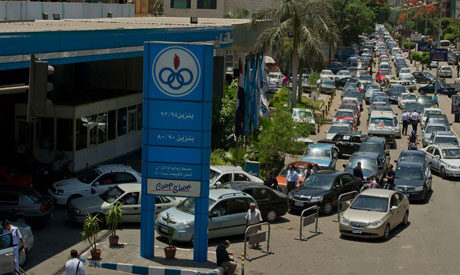Will the fate of new political developments in Egypt be determined by energy?
That is the question in the minds of many observers as the people cast their votes to elect their president later in May and the new regime will face the tough issue of how to handle the declining supply of gas to power stations and to consumers at large from day one .
Power outage even before the summer picks up became a normality, in addition to long gas lines that were the result of growing subsidies, lack of new investments and accumulated arrears that belong to supply companies.
The subsidies that almost benefit everyone cost the treasury some $20 billion according to energy officials, and that amounts to one-fifth of the total government spending.
Moreover, because of this subsidy the government has to pay companies, including foreign ones, the difference. And all that resulted into $4.8 billion arrears that have to be handled to ensure that these companies continue to provide supplies.
However, in the meantime, Cairo started to look for options like a quick import of petroleum products to the tune of $1 billion that is being mooted.
Contacts are already under way with Algeria’s Sonatrach, which is known as a major gas exporter in the region to provide some gas supplies to Egypt.
The figure of 400 million cubic meter a day is being discussed, though there is no concrete outcome as yet. But importing liquefied natural gas (LNG) requires establishing an LNG import facility that is not available yet.
But more interesting is that Israel is showing up as a potential supplier of gas to Egypt.
It was in 2008, three years before the ousting of former President Hosni Mubarak, that Egypt entered into a concessionary agreement to export gas to Israel, but that agreement became subject to criticism as it was seen under-priced.
And following the toppling of Mubarak, the pipeline carrying gas to Israel was hit 14 times to the extent that it became useless to keep on repairing it.
But more seriously the supply issue became apparent and that given the ongoing instability, dried investments and the subsidies, Egypt will not be able to meet its export commitments.
However, over the past four years gas discoveries in Israel accelerated and, according to industry sources, the Tamar field alone contains some 240 billion cubic meters.
Israeli Prime Minister Benjamin Netanyahu and his Energy Minister Silvan Shalom both pushed for exporting some 40 percent of the Israeli gas, leaving the remaining 60 percent for domestic consumption. And in their calculation such an arrangement will give Tel Aviv 25 years of gas generated income as well as securing domestic needs.
Egypt is one of the potential markets Israel is eyeing, a move that will twist roles, but for those who argue that mutual economic interests provide the best security and base bilateral relations on a more sound ground, nothing much has changed.
Egypt used to export to Israel and now Israel is keen to do the same.
But it remains to be seen whether Tel Aviv will be more willing to agree on a concessionary deal as Mubarak did.
However, in the heart of all this debate is the central issue of subsidies and to what extent the state will continue to shoulder that burden.
Blanket subsidies, as is the case with energy subsidies in Egypt, provide an open invitation for consumption increase at a time when even those who could afford paying higher prices don’t, but removing subsidies is a dangerous political move.
It is hard to see a new regime start its rule with such a step. However, though subsidies could be a real hot potato to handle, in the end it is the tip of the iceberg for a whole lot of political, economic and social issues that have to be faced by the new regime.
In announcing his candidacy for the country’s top post, Field Marshal Abdel Fattah El-Sissi did not mince words when he said that rough times are ahead, that sacrifices are to be made.
He enjoys an undisputed popularity and mandate that will take its formal shape in a constitutional way after May elections. And that is where the real test starts to turn that popularity into an agreed political program for Egypt’s revival.

